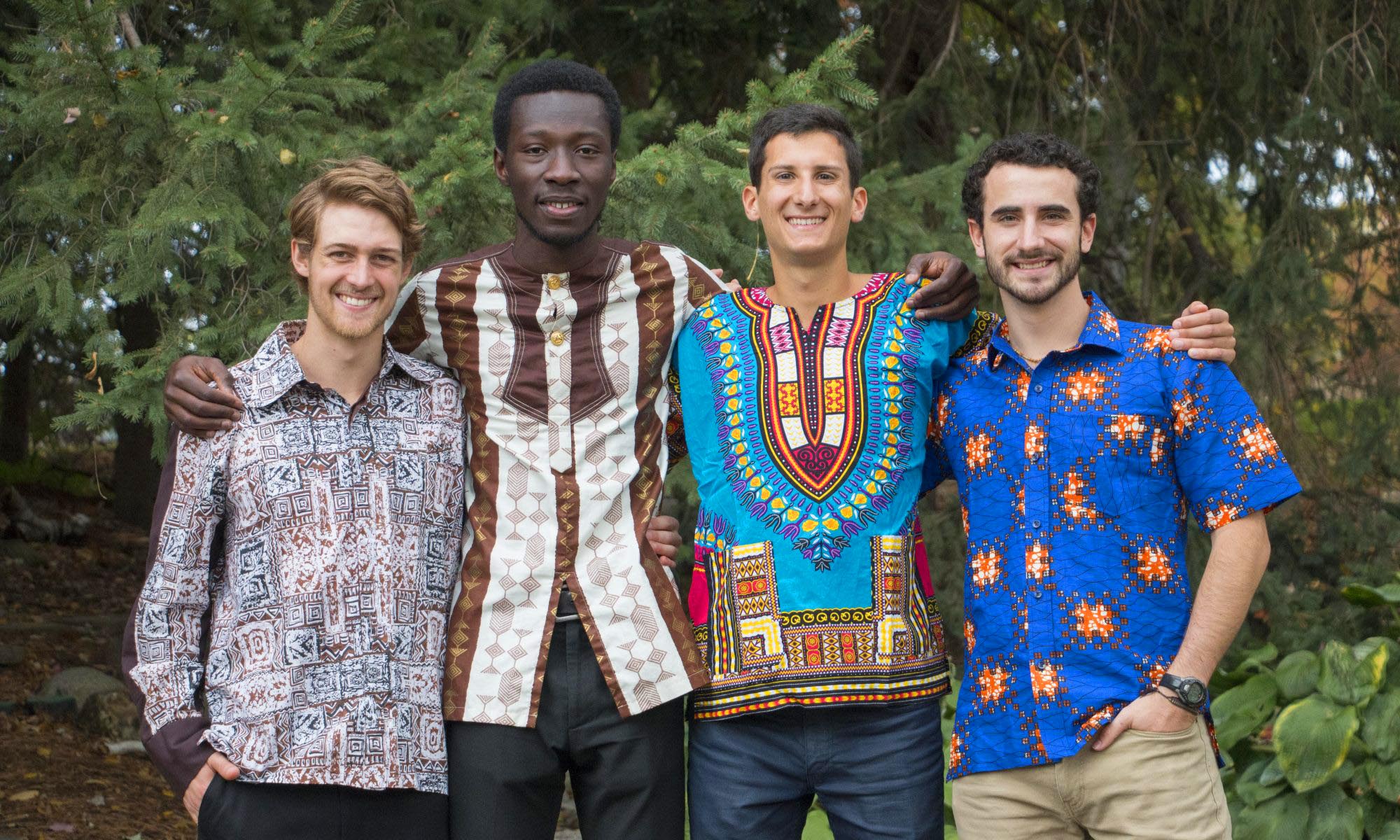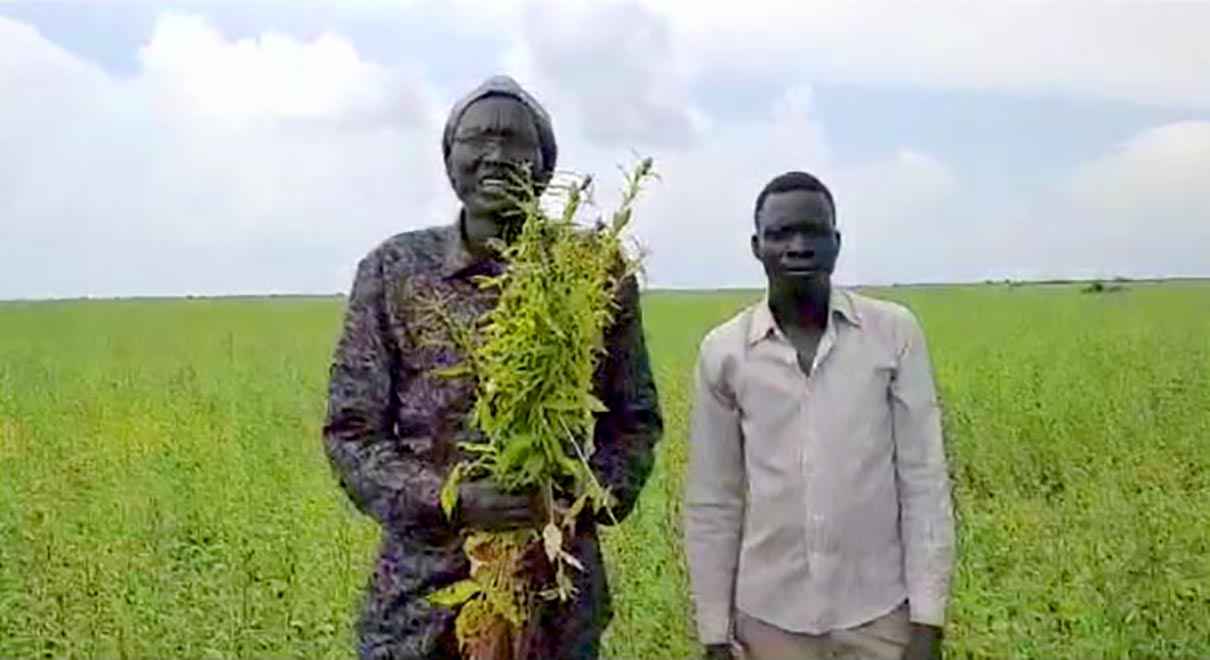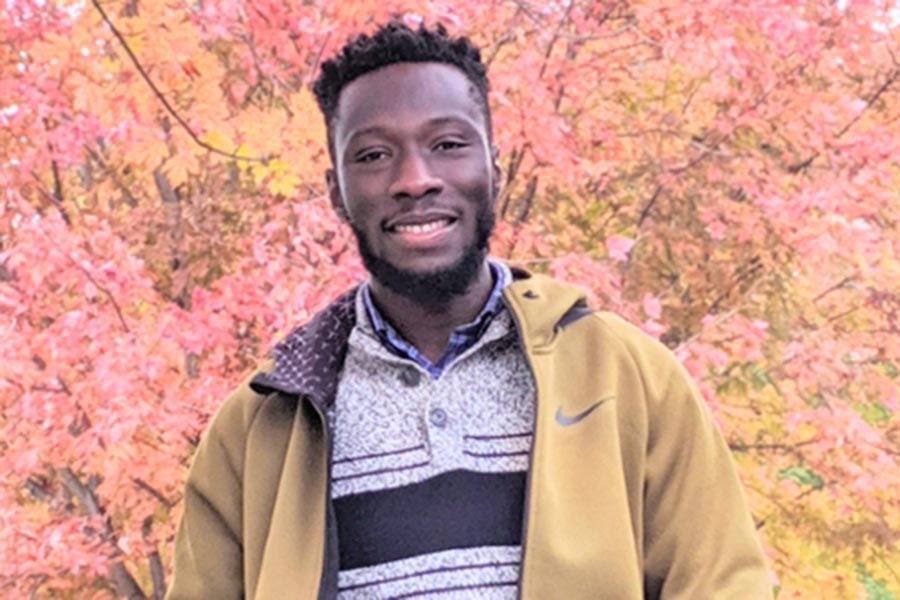Edwin Kpodzro: sowing seeds of innovation for global impact
Open Sesame
“My broad interests are in solving complex challenges, which tend to be system-based,” says Edwin. “There’s no more complex system than securing food, energy, and water in the developing world.”
Edwin was born and raised in Accra, Ghana. He came to the United States to attend Calvin University in Grand Rapids, Michigan. In his senior year, he joined like-minded students in an ambitious senior design project, designing machines for farmers in sub-Saharan Africa that would add value to their crop yields.

“Much of Africa is rich in natural resources, but the farmers who grow these crops seldom make enough money, because the processing is done by middlemen in other countries,” says Edwin. “These farmers are breaking their backs to harvest these crops, but have little-to-nothing to show for their work.”
Edwin’s team connected with a project in South Sudan, one of the world’s youngest (and poorest) countries. One of their primary cash crops is sesame seeds; yet most South Sudanese lack the infrastructure to process the seeds into the valuable oil used around the world. So Edwin and his fellow students set out to design easy-to-use and locally-sourced machines that allow the South Sudanese to extract the sesame oil, sharing the profits as part of a co-op system with the many different tribes in the area surrounding the town of Malakal.
“We quickly realized this was more than just building a cool machine,” says Edwin. “It touched on just a tiny aspect of a much larger problem. It made me want to dive even further into these issues, which focused more on the holistic system and people aspects of engineering, rather than just the machines.”

Global Focus
After graduating, Edwin decided not to go into industry right away, but pursue a graduate degree. He found what he was looking for in West Lafayette. “I saw that Purdue had a global focus,” he says, “and they also had world-class faculty in many different areas that all collaborate across disciplines, which was perfect for me.”
Edwin is a Ph.D. student in Ecological Sciences and Engineering, an interdisciplinary graduate program. While technically a mechanical engineering major, his graduate cohort features political scientists, agronomists, civil engineers, forestry and natural resources students, and many others. “It was great to hear from people with different training than me, because everybody brings something different to the table,” says Edwin. “Originally I never would have taken political science classes, but it really opened my eyes to the importance of good policy, which one of the most critical ways that long-term solutions are instituted.”
He began doing research under Fu Zhao, working on an economically viable method of recovering lithium and cobalt from discarded electric vehicle batteries. But he still felt he had unfinished business with his passion project in South Sudan. “My goal on a wider scale is to look at how machines, products, and processes fit within a business model, which fits in a complex ecosystem,” he says. “We’re looking at the triple bottom line: social, environmental, and economic.”
Regarding the sesame seed harvesting project, Edwin asks: “How do we come up with a sustainable and resilient business model that will last over time? Much of the work to this point has been based on assumptions that are unproven – which is really the case with all new projects. But an idea is only an idea until it’s tested. My work is focused on developing empirical evaluation methods and related testing activities that can be pursued to assess critical assumptions underlying the proposed concept, foster learning along the way, and inform the development of a highconfidence business model for economic development in Malakal and its environs. The hope is that this framework can be applied to similar resource-rich but income-poor regions around the world, and indeed to any business in emerging markets.”
Edwin found the perfect co-advisor in Joseph Sinfield, professor of civil engineering. Sinfield is the director of the Institute for Innovation Science, which studies the mindsets, behaviors, tools and methods of innovative individuals and organizations. They also play a role in LASER PULSE, a Purdue-hosted $70 million USAID consortium that combines academic research with global development solutions. Edwin is a graduate research assistant in Purdue’s Global Engineering Programs and Partnerships (GEPP) Office, helping with international programs and assisting in the teaching of the undergraduate Global Engineering Learning Community classes. Edwin’s project also receives support from the Shah Family Global Innovation Lab, an endowment created by Manahar Shah (MSME ’68) to bring Purdue Engineering expertise to solve global challenges.

Youth Ag Summit
In November 2021, Edwin was chosen to attend the Youth Ag Summit, an event hosted by agribusiness giant Bayer. The 100 delegates represented every region of the world, including Edwin’s home country of Ghana. The two-day virtual summit featured international agriculture and development experts, including the CEO of Mercy Corps, and plant scientists at NASA.
After the summit, the delegates will participate in a 10-week “virtual university” course, where they will be equipped with resources to develop their respective projects. Much like Edwin’s interdisciplinary grad program, he’s also looking forward to joining forces with fellow delegates to collaborate on their work. Edwin’s knowledge of and experience with complex systems, problem framing, and solution development - skills his Purdue education has vastly improved - positioned and prepared him well to participate in this summit.
Edwin knows the road ahead won’t be easy. South Sudan has struggled with civil war since its founding in 2011. While a tenuous peace deal is in place, there are still multiple issues, including lack of education; food and clean water; lack of Internet and other infrastructure; and continuing ethnic conflict. But Edwin sees multiple opportunities to have a positive impact.
“This is what I am choosing to do with my engineering education and passion for a better world,” he says. “I know how difficult it is to grow up in this environment. They have no lack of resources, or talent, or hard work. They just need a system that uplifts them, gives them a voice, and empowers them to live fulfilling, dignified lives.”
“One theme I kept hearing at the summit was ‘think globally, act locally,’” says Edwin. “You can easily be overwhelmed by trying to tackle a complex global challenge that affects many people. But we have the ability to apply our engineering methods and innovation science to create change, whether it’s here in West Lafayette, or Chicago, or Ghana, or South Sudan. Even if it’s just for a handful of people, I will count that as a good day’s work!”
“Developing world issues are no longer confined to the developing world,” he continues. “Look at Ebola in 2014, where a pandemic hit West Africa and forced people to quarantine and social distance. Six years later, COVID did the exact same thing here in the United States! I volunteer at a food pantry in West Lafayette, and I saw how hard it hit families. More than ever, people are starting to realize we need to solve these problems on a global scale.”
Edwin also sees a broader role for engineering in the developing world. He helped to create a student networking group at Purdue, GRID (Graduate Researchers for International Development), and is always looking to collaborate with partners, both local and global. “Engineers have a unique ability to make sense out of the world,” he says. “Whether you’re designing a building, a car, or any other complex system, the end goal is to enhance people’s lives. Engineering gives us the widest range of possibilities to do good work and to influence other people in a positive way.”
Source: Edwin Kpodzro, ekpodzro@purdue.edu
Writer: Jared Pike, jaredpike@purdue.edu, 765-496-0374

